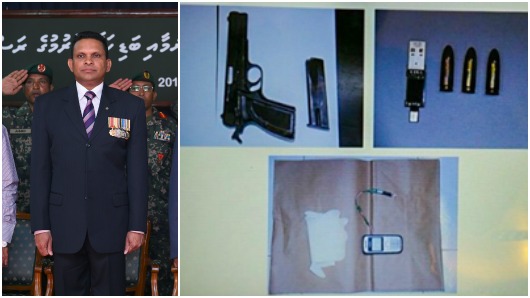Defence Minister Moosa Ali Jaleel and Tourism Minister Ahmed Adeeb led a motorcycle parade on Saturday calling for a speedy judgment in former President Mohamed Nasheed’s terrorism trial over the 2012 military detention of Criminal Court Chief Judge Abdulla Mohamed.
Jaleel was the chief of defence forces when Judge Abdulla was arrested and faces the same terrorism charges. If convicted, the pair face between 10 and 15 years in jail or banishment.
Senior government officials, ruling Progressive Party of the Maldives (PPM) MPs and hundreds of young men took party in the rally. They carried placards that read: “Justice for Judge Abdulla,” “Sentence Nasheed now,” “Everyone is equal in front of the law.”
Jaleel has denied involvement in Judge Abdulla’s arrest, claiming the chief of defence forces had been reduced to a “ceremonial” official by then-Defence Minister Tholhath Kaleyfaanu.
Four state witnesses have backed Jaleel’s statement in court, claiming he had not participated in any military meetings prior to Judge Abdulla’s arrest.
Speaking after the rally, Adeeb called on the opposition to stop its nightly protests against Nasheed’s February 22 arrest and terrorism charges.
“Don’t make us take to the streets. These are Malé City’s youth. This is a very strong crowd. If these young men get angry it would not be good. That’s why we are with these young men in their homes. We are people who love peace, so don’t make us come out to the street,” Adeeb warned, according to Sun Online.
“We won’t give him [President Nasheed] anymore chances. You [the opposition] will also have to go home. Then we will also quietly stay home,” he added.
Tension has been high in Malé since Nasheed’s arrest. The former president’s Maldivian Democratic Party (MDP) and Jumhooree Party (JP) have formed an alliance against what they call President Abdulla Yameen’s repeated constitutional violations and intimidation of political rivals.
The opposition claims Nasheed’s trial is unjust. Former Defence Minister Mohamed Nazim who is standing trial for importing and possessing illegal weapons is being framed, they also claimed.
MDP today condemned Adeeb’s speech, accusing him of threatening the opposition with violence.
“MDP is alarmed by the threats of violence against opposition protesters, made by senior members of President Yameen’s administration,” a statement issued by the party today read.
MDP claimed that the bike rally was attended by “well-known gang members”.
“This is a desperate and dangerous escalation of the current crisis by the government. President Yameen’s administration is baring its fangs,” Spokesperson for MDP Hamid Abdul Gafoor said in the statement.
Three of the young men seen in the front-lines of the bike rally – Fazeel Ahmed, Mohamed Asif and Razzan Abduhrahmaan – had previously been charged with murders but were acquitted by the Criminal Court.
Fazeel had been charged with the murder of 15-year-old Ahmed Shaneed in 2008, while Asif and Razzan were charged with the 2012 murder of 33-year-old Ali Shifan.
The opposition has long accused Adeeb of illicit connections with gangsters. The tourism minister has dismissed the allegations.
When President Nasheed resigned in February 7, 2012 in the wake of a police and military mutiny, he accused Jaleel of downplaying the mutiny. Jaleel, who had served in the army for 30 years, retired after the controversial transfer of power.
Jaleel signed for the PPM last year and President Yameen appointed him as the Ambassador for Pakistan. When Nazim was dismissed from his cabinet post in January after the controversial weapons find, Yameen appointed Jaleel as his replacement.
Related to this story
Former chief of defence forces denies involvement in Judge Abdulla arrest
Chief Judge “took entire criminal justice system in his fist”: Afeef
